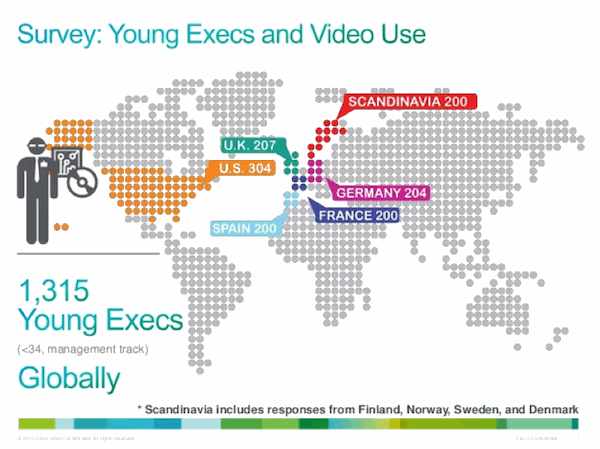Report: Gen Y Executives Prefer Video

A daily selection of features, industry news, and analysis for AV/IT professionals. Sign up below.
You are now subscribed
Your newsletter sign-up was successful
Courtesy of Cisco
As digital natives ascend management ladders in the US and Europe, they are bringing new communication tools with them. According to a survey, conducted by Redshift Research for Cisco and released yesterday, top-tier Gen Y executives plan to use video in ways unavailable to earlier generations: as tools to collaborate with their teams, save travel costs, and develop new business.
- The 2013 Cisco Global Young Executives' Video Attitudes Survey tapped more than 1,300 executives aged 34 years or younger. The report found that 87 percent of respondents believe video has a significant and positive impact on an organization, enhancing business culture, breaking down language barriers, and attracting new talent.
- These findings dovetail with the rapid adoption of enterprise-grade browser-based videoconferences such as Blue Jeans. With the notable exception of Yahoo, global companies are increasingly utilizing video to expedite decision making and augment the impact of discussions, a 2013 Wainhouse Research and Polycom study showed.
- Angie Mistretta, Cisco's telepresence solutions marketing director, believes that this survey presages a bright five-year forecast for business-video. Specifically, we should expect to see an acceleration in business-grade videoconferencing adoption. "Video is at a critical point right now," she explained. The public's familiarity with video calling and apps like FaceTime are compounded by the improving quality of video chats across multiple platforms. Gen Y executives, as they climb the management ranks, bring "a very low tolerance for low-quality video, or calls dropping out," she said.
More corporate budgets are shifting and recalibrating to allocate the necessary IT budgets for videoconferencing, Mistretta added. As young executives articulate to stakeholders the value of video in building rapport and developing new business, it will become easier to justify the expense. Organizations like schools, courtrooms, and hospitals are leveraging videoconferencing to cut costs and serve more users with services like language translation and sign-language assistance.
This survey also portends that the video-savvy Gen Y leaders will take more active roles as "videos ambassadors," Mistretta explained. And they are clear about where they will take their talent; 87 percent of respondents said that they would rather work for a video-enabled organization over a company that does not support business-class video communications.Margot Douaihy is the editor of EduWire.com and AV Technology magazine.
A daily selection of the top stories for AV integrators, resellers and consultants. Sign up below.
Margot Douaihy, Ph.D., is a lecturer at Franklin Pierce University.

